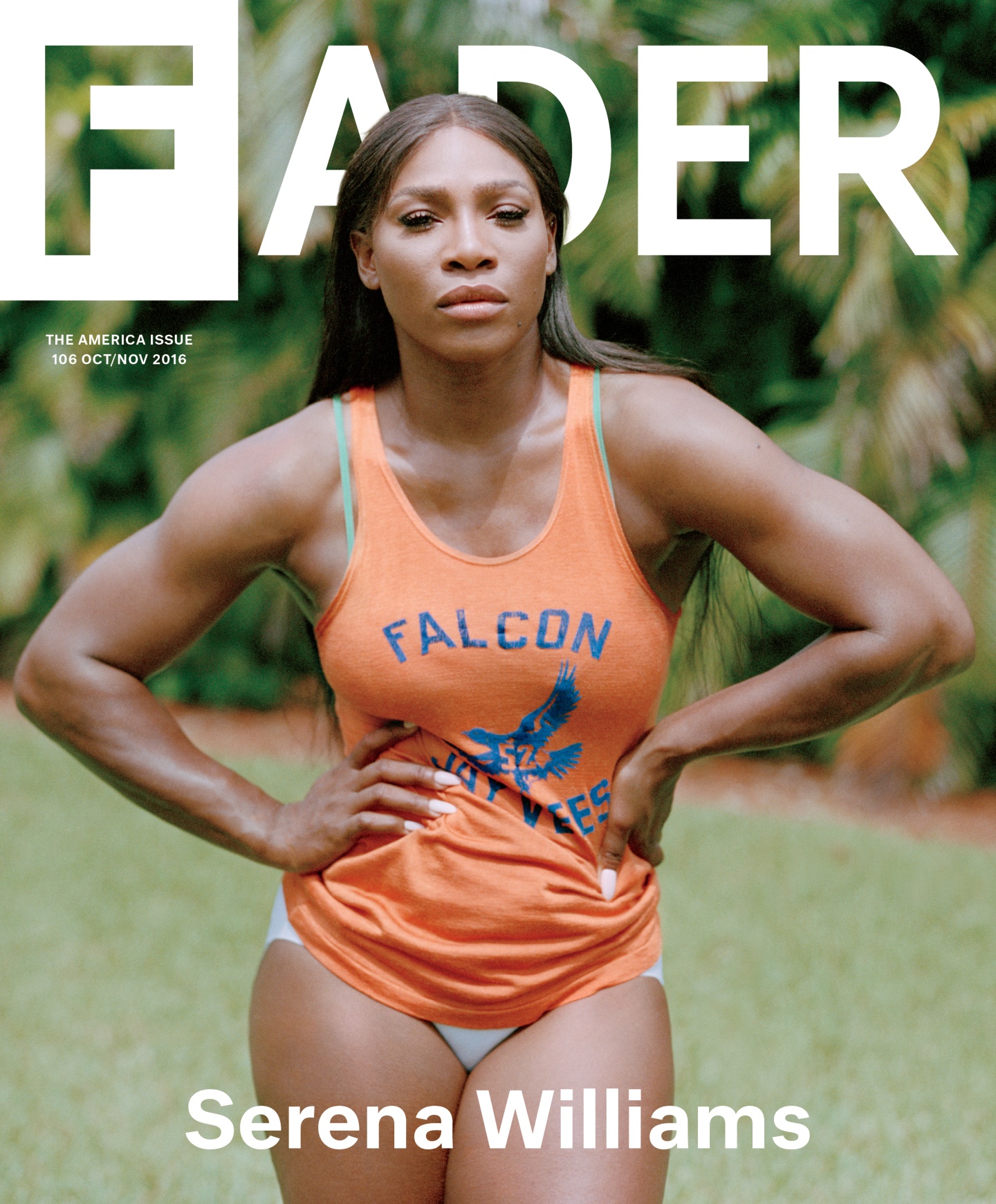11 Things We Learned About Serena Williams From Her FADER Cover Story
Including her impending entrance into the tech industry, her respect for Nelson Mandela, and her annual dance recitals.

For The FADER's America Issue, we sent writer Elena Bergeron down to Florida to spend some time with the GOAT: Serena Williams herself. Reading the raw, illuminating conversation that followed, we fell in love even more with this powerful, dominant, thoughtful, once-in-a-generation athlete. Here's what we learned.
1. She still can’t stand to watch Venus play on TV.
“I just… I can’t watch her,” Serena says of her older sister. “I watch her in person at a tournament, but I get so nervous on TV. I feel like in person she can hear me say, ‘Come on!’ — cause I know when I hear her say ‘Come on,’ a familiar voice, it really helps me. It doesn’t really help when I’m screaming at the TV.”
2. She’d always dreamt of traveling to Africa.
"That was just my main goal for as long as I can remember. I gotta get back to Africa. I want to see my roots, where I’m from. I want to see the struggle. I want to see the slave castles. I need to see that journey. I just wouldn’t have felt full if I had never experienced that."
3. She learned French partly to better converse with fellow members of the diaspora.
"One of the reasons I learned French was I wanted to win the French Open, and I wanted to speak French when I won. The second was because, most African countries, the main language outside of their local language is French or English. So I figured: I know English, maybe I can learn French."
4. Since nabbing her first Grand Slam, she hasn’t read a single article about herself.
"Since the day I won the U.S. Open, my very first Grand Slam, I never read articles about myself. If I saw my name mentioned, I’d look away. I looked at the pictures, but that’s pretty much it. I didn’t want to get too cocky, and at the same time I didn’t want to have that negative energy."
5. Her raised-fist at Wimbledon was almost a subconscious act of solidarity.
"I came home and my friends were like, 'Thank you for that. I got so inspired and that meant so much.' I was like, OK. Did I even…? Sometimes I’m in the moment and I don’t realize what’s going on. I took that symbolism and I ran with it, though."


6. She credits her return to Indian Wells to Nelson Mandela.
In 2001, in the course of winning the Indian Wells tournament in California, Williams was abused by the crowd, who, Bergeron writes, "hurled racial epithets at her and her family." Williams' boycotted Indian Wells until 2015. Explaining her decision to return, Williams credits a meeting with Nelson Mandela. "We’ve had conversations," William says of Mandela, "but it wasn’t until years later and reading his biography that I really felt like I met this man. It took a minute to click, it didn’t just happen overnight. But I realized that everything that I’m about, the way that I was raised, and everything that I’ve been born to do is all about forgiveness and moving on, and I just felt like it was all about the right time to do it."
7. She doesn’t speak in detail about politics.
Williams avoids frank public political conversations, explaining her decision as being rooted in her faith (she's a practicing Jehova's Witness, who traditionally remain politically neutral). "Issues that I feel that I live in and am dealing with, like, Oh, do I deserve less prize money because I’m a female? — yeah, that’s something I do speak about," she says. "How I feel about [the election] is it would be different if a woman was president. But I don’t get involved in politics because of my religion."
8. Her Lemonade moves are based on her real-life dance-floor habits.
"I actually do dance a lot, so when that opportunity to appear in Lemonade came up and we were working with choreographers, just trying to figure out what to do, it was really kind of organic … I’ve been taking dance classes because it’s actually super challenging. I have a lot of friends that take it with me. I make fun of them, and they make fun of me in the class. We do it year-round, and we always see who’s improved the most, then bam, put on a show, which is kinda ridiculous but really fun."

9. Her famous work-ethic is now pushing her into the tech world.
During The FADER’s sit-down, Elena Bergeron writes, Serena was multitasking like crazy: she was “juggling plans for a New York Fashion Week presentation, self-critiquing the practice session she extended the day before, and working on the development of her own app. There are times when Williams finds all those thoughts converging and she tells me she’ll whisper to herself, ‘Serena, don’t tire out. This is a lot. Serena, you can do it. Just don’t tire out.’”
10. Her anger is often her fuel.
“If I don’t have that intensity or that anger, I’m not doing as well as I need to do to win. Sometimes I almost need to get angry to win, which is really, really weird but it works for me.”
11. She believes in you too.
"It’s important to not put yourself in a position to be like, I’m better than this person or I’m doing more, I’m this or there’s no one like me. That’s true that there’s no one like me. There’s no one like you, no one like the guy down the street. So I don’t ever think like that. I never thought about any of this. I honestly started out with a tennis racquet and a dream — everything else came out of that."